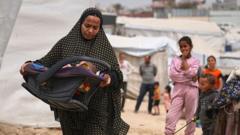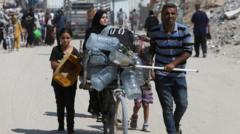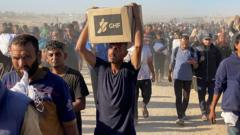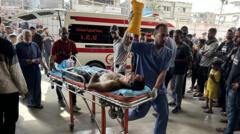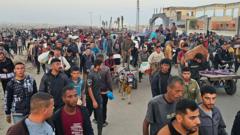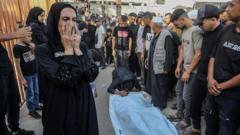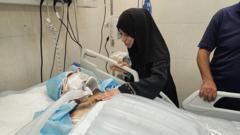As the conflict in Gaza rages on, expectant mothers and newborn infants face unprecedented challenges. With severe shortages of food and medical supplies exacerbated by the Israeli blockade, reports indicate increased rates of underweight births, miscarriages, and maternal distress. Healthcare professionals highlight the urgent need for support as many pregnant women are unable to access basic prenatal care, and childbirth conditions become increasingly perilous.
Dire Consequences of Conflict: Pregnancy and Childbirth Challenges in Gaza
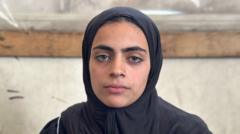
Dire Consequences of Conflict: Pregnancy and Childbirth Challenges in Gaza
The ongoing war in Gaza has severely impacted pregnancy and childbirth, heightening risks for mothers and newborns amid a humanitarian crisis.
Amid the relentless turmoil of war in Gaza, the plight of pregnant women and newborns is reaching alarming levels. With acute shortages of food, medical supplies, and a constant threat from ongoing violence, the situation is catastrophic for new lives entering the world. The UN reports that one in ten newborns is now underweight or born prematurely, as mothers grapple with malnutrition and insufficient access to prenatal care.
At Nasser hospital in Khan Younis, Malak Brees, who is seven months pregnant, faces overwhelming anxiety about the safety of her unborn child. After losing significant amniotic fluid due to malnutrition, she laments, "It's in the hands of God - the fetus could survive or die." Such dire conditions echo throughout Gaza, where access to vital health services is almost non-existent.
The Israeli blockade, which has crippled the region since March, has left hospitals struggling with minimal resources. Doctors report that women are forced to give birth in makeshift shelters, often without proper medical assistance. Those who do manage to reach hospital care face rapid discharges, with many mothers sent home only hours after giving birth or after C-sections, often to inadequate living conditions.
Overwhelmed hospitals, such as Nasser, are facing an influx of patients after attacks on nearby healthcare facilities. With essential prenatal monitoring being unaffordable for most women due to dire resource scarcity, many expectant mothers fear complications related to malnutrition and inadequate medical oversight.
Women like Aya al-Skafi have experienced unimaginable heartache; her infant daughter, Jenan, succumbed to malnutrition after her mother could not find the formula she needed due to an ongoing food crisis. "I begged for help," Aya recalls, her grief palpable.
While some organizations, like the Gaza Infant Nutrition Alliance, aim to train local healthcare providers to support breastfeeding, many mothers struggle due to their own health issues. Nurses report countless stories of mothers facing insurmountable odds, including losing infants shortly after birth due to lack of care and support amid chaotic evacuations.
In Gaza, the process that once symbolized joy and new beginnings has turned into a harrowing ordeal marked by fear and despair. Babies, once celebrated as symbols of hope, now reflect the overwhelming struggle for survival in a region devastated by conflict. The global community watches and waits, as reports continue to underscore the urgent need for action and support for those affected.








